

En sintonía con el mundo: apps para escuchar radio. La radio evoluciona gracias a las aplicaciones.
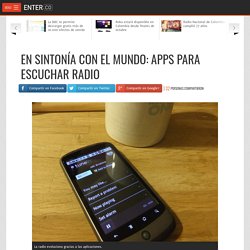
La radio es un medio de comunicación que tiene que convivir con la ‘competencia’ que le han planteado nuevos medios originados en medio de la era digital. Esto ha llevado a que la radio, al igual que muchos otros medios, se vaya trasformando para adaptarse gracias a la tecnología que nos rodea. Escuchar la radio es un concepto que no significa lo mismo que en años atrás, ya que por medio de nuevos dispositivos podemos acceder a ella, al tiempo que realizamos otras actividades o usamos otras aplicaciones. Un beneficio que la tecnología nos aporta al hablar de la radio, es la posibilidad de conocer la oferta que este medio de comunicación nos brinda alrededor del mundo, algo que anteriormente era mucho más complejo. A continuación podremos ver algunas aplicaciones con las cuales podremos escuchar todas las emisoras del mundo desde un solo clic: Radio Garden De una manera muy dinámica podemos encontrar todas las emisoras de radio del mundo.
BBC Academy - Journalism. BBC Academy - Production - Transmedia storytelling. This week's episode of the CoP Show explains what transmedia storytelling is and why producers might want to use it.
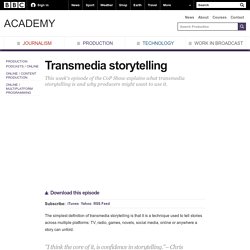
The simplest definition of transmedia storytelling is that it is a technique used to tell stories across multiple platforms: TV, radio, games, novels, social media, online or anywhere a story can unfold. "I think the core of it, is confidence in storytelling. "– Chris Sizemore A transmedia storyteller may create many "entrypoints" across different platforms, so that, for example, a fan of a drama can read the online diaries of their favourite characters or follow their comments on Twitter. The theory goes that by doing this not only can you give your audience more of what they want and love but you can also bring in a whole new audience that otherwise would not find your content.
To discuss transmedia storytelling Simon Smith is joined by Chris Sizemore, Adrian Hon and Meg Jayanth. Chris Sizemore is an executive editor for BBC Learning & Knowledge online. Spreadable Media. A Global Study of Eyewitness Media in Online Newspaper Sites. Data & Society: Points. The Art of Molly Crabapple. Baratunde. Social Network Analysis: An Introduction by Orgnet,LLC. Social network analysis [SNA] is the mapping and measuring of relationships and flows between people, groups, organizations, computers, URLs, and other connected information/knowledge entities.
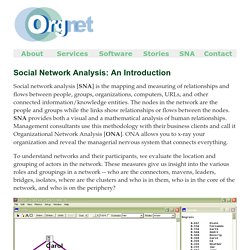
The nodes in the network are the people and groups while the links show relationships or flows between the nodes. SNA provides both a visual and a mathematical analysis of human relationships. Management consultants use this methodology with their business clients and call it Organizational Network Analysis [ONA]. ONA allows you to x-ray your organization and reveal the managerial nervous system that connects everything. To understand networks and their participants, we evaluate the location and grouping of actors in the network. We look at a social network -- the "Kite Network" above -- developed by David Krackhardt, a leading researcher in social networks.
Degree Centrality. Social Media Toolkit. This is a collection of tips, recommendations, tools and pieces of social media best practice.
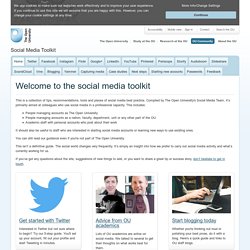
Compiled by The Open University's Social Media Team, it’s primarily aimed at colleagues who use social media in a professional capacity. This includes: People managing accounts as The Open UniversityPeople managing accounts as a nation, faculty, department, unit or any other part of the OUAcademic staff with personal accounts who post about their work It should also be useful to staff who are interested in starting social media accounts or learning new ways to use existing ones. You can still read our guidance even if you're not part of The Open University. About - Digital Media Research Centre. Our vision The Digital Media Research Centre (DMRC) conducts world-leading research that helps society understand and adapt to the social, cultural and economic transformations associated with digital media technologies.
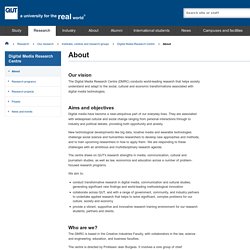
Aims and objectives Digital media have become a near-ubiquitous part of our everyday lives. They are associated with widespread cultural and social change ranging from personal interactions through to industry and political debate, provoking both opportunity and anxiety. ABC - Tu diario en español. Chase Jarvis Blog. Council on Foreign Relations. Bradford-delong.com: Grasping Reality with the Invisible Hand... Nonpartisan, non-advocacy public opinion polling and demographic research. Media Commentary — Callie Schweitzer.
How We Internet: Finding the right news among too many options: The days of waiting for the newspaper thud outside the front door are over, and it’s no longer up to the editors of the New York Times to decide the lead story of the day.
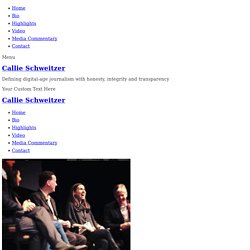
The process of getting news involves more choice than ever. We have access to unlimited options and sources to fill what seems like ever more limited time. This paradox of choice can be incredibly overwhelming if it’s not streamlined or ritualized in some way — hence why we form news reading habits. Q&A with USC Annenberg on the future of news: I think we’re seeing the most incredible and exciting time in journalistic history. Douglas Rushkoff. Wordyard — Hand-forged posts since 2002. Lawrence Krauss. Grade the News. 89.3 WFPL News Louisville. Joho the BlogJoho the Blog - Let's just see what happens. The hosts of the BardCast podcast consider Cymbeline to probably be Shakespeare’s worst play.
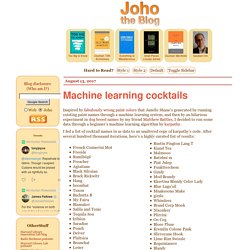
Not enough happens in the first two acts, the plot is kuh-razy, it’s a mishmash of styles and cultures, and it over-explains itself time and time again. That podcast is far from alone in thinking that it’s the Bard’s worst, although, as BardCast says, even the Bard’s worst is better than just about anything. Nevertheless, when was the last time you saw a performance of Cymbeline? Businessinsider. Listicles, aggregation, and content gone viral: How 1800s newspapers prefigured today’s Internet. “If you think BuzzFeed invented the listicle, you haven’t spent enough time with 19th-century newspapers, because they’re everywhere.”
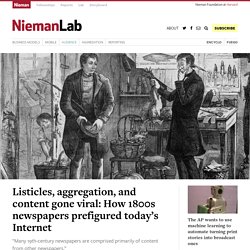
That’s Ryan Cordell, a Northeastern University professor who researches virality in 19th-century newspapers, during a talk he gave recently at MIT. MediaLIT: My Media Use – Mediactive. I’m asking folks taking our “MediaLIT: Overcoming Information Overload” MOOC course to describe their media use for a full day.
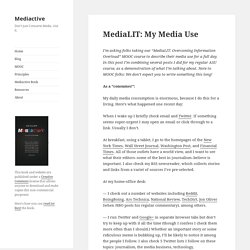
In this post I’m combining several posts I did for my regular ASU course, as a demonstration of what I’m talking about. About Me & Disclosures. JEFF JARVIS is the author of Geeks Bearing Gifts: Imagining New Futures for News (CUNY Journalism Press, 2014), Public Parts: How Sharing in the Digital Age Improves the Way We Work and Live (Simon & Schuster, 2011), What Would Google Do?
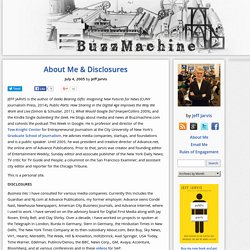
(HarperCollins 2009), and the Kindle Single Gutenberg the Geek. He blogs about media and news at Buzzmachine.com and cohosts the podcast This Week in Google. He is professor and director of the Tow-Knight Center for Entrepreneurial Journalism at the City University of New York’s Graduate School of Journalism. He advises media companies, startups, and foundations and is a public speaker. Until 2005, he was president and creative director of Advance.net, the online arm of Advance Publications. Latoya Peterson. CNN Profiles - Brian Stelter - Host, Reliable Sources & Senior Media Correspondent. Brian Stelter is the host of "Reliable Sources," which examines the week's top media stories every Sunday at 11:00 a.m. ET on CNN/U.S, and the senior media correspondent for CNN Worldwide. Stelter reports and writes for CNN and CNNMoney.
Prior to joining CNN in November 2013, Stelter was a media reporter at The New York Times. Starting in 2007, he covered television and digital media for the Business Day and Arts section of the newspaper. He was also a lead contributor to the "Media Decoder" blog. Eduteka - Alfabetismo en Medios > Guía > Definición. DEFINICIÓN DE Alfabetismo en Medios El Alfabetismo en Medios se define como la habilidad para acceder, analizar, evaluar y crear mensajes en una diversidad de formatos mediáticos (desde impresos, como revistas o periódicos, hasta Videos o publicaciones en Internet).
Adquirir esta habilidad conduce, de una parte, a comprender el papel que juegan los medios masivos de comunicación en la sociedad y, de la otra, a entender las habilidades esenciales de la indagación informada (toma de conciencia, análisis, reflexión y acción) y la auto expresión, necesarias para que los ciudadanos participen activamente en una Democracia (CML MediaLit Kit ). El objetivo de trabajar en la escuela el Alfabetismo en Medios, es ayudar a que los estudiantes se conviertan en personas competentes, críticas y alfabetas en los diferentes formatos de estos; lo que se logra realizando en el aula producciones para diversos tipos de Medios con diferentes herramientas mediáticas.
Welcome. Information and news from the Center for News Literacy at Stony Brook University. Just in case you were still wondering… Diamond “Lavish” Reynolds changed our perception of media last week with her shocking and heartbreaking real-time web video of the last minutes of Philando Castile’s life. The couple, with her daughter riding in the back seat of their sedan, had been pulled over by local police in a Minneapolis suburb, and Reynolds had the astonishing presence of mind to send the aftermath of Castile’s shooting by a police officer — which included her arrest by cops who didn’t even try to save his life — to the world via Facebook’s “Live” video platform.
Countless articles, analyses, commentaries, and other posts have chronicled a media shift in those moments. The implications are real, and important. We are only beginning to confront the issues they raise. Mediactive – Don't Just Consume Media. Use it. National Association for Media Literacy Education. Brought to you by the CILIP Information Literacy Group. Kirsten McCormick, a librarian at Glasgow Life public libraries, was the recipient of a CILIP Information Literacy Group bursary to attend the European Conference on Information Literacy (ECIL), which is taking place this week at Charles University in Prague, Czech Republic.
Kirsten has provided us with a short report reflecting on her experiences at this key event in the international IL calendar. A Powerful Scene: ECIL2016 Thanks to a generous bursary from ILG, my walk to work this morning took in spectacular views from Charles Bridge in Prague. I’ve come to ECIL2016 to learn more about theory, research, and best practice in the field of information literacy. Already, my expectations around the passion and dedication of experts in the field and the insight they can lend to my own practice have been exceeded. The theme for the fourth international conference, organised by the Association of Czech Universities, is the inclusive society.
Table of Contents. Communication and Information. Skip to the navigation. Skip to the content. Communication and Information Previous Building Knowledge Societies Next. Media Literacy. David Considine, chair of the first National Media Literacy Conference in 1995, defines media literacy as the ability to access, analyze, evaluate and create information in a variety of media formats including print and non-print. It is mindful viewing, and reflective judgement.
It is a new, expanded view of traditional literacy. He writes that "since most people today get most of their information from television and other visual technologies, informed students and citizens need the new information skills involved in media literacy. School systems around the country are increasingly including these competencies in the emerging curricula. Media Literacy. Media Literacy Project. For centuries, literacy has referred to the ability to read and write. National Association for Media Literacy Education. Alfamed. Grupo Comunicar - www.grupocomunicar.com. A New Zealand site covering pop culture, sport, politics and social life through features, criticism, interviews, videos and podcasts. Home.